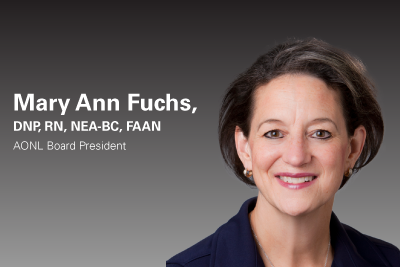
Voice of the President | May 2021
Since the year 2000, the RN workforce has experienced rapid growth with more than 1 million new RNs joining the profession. Recent projections are that 1 million more will be added to our ranks by 2030. Given the concurrent shifts that occurred during this same time period—a large proportion of RNs approaching eligibility for retirement, an increase in educational preparation, a focus on quality and safety, and the explosion of technology as part of our care delivery—this is remarkable growth. However, no one could have predicted the impact that the COVID-19 pandemic is having on the well-being of our current nursing workforce. Despite this, the American Association of Colleges of Nursing (AACN) reports nursing schools are experiencing a 6% increase in applications since the pandemic began. With the growing number of older Americans and the possibility of future health threats like COVID-19, the need to effectively prepare the next generation of RNs is more important than ever.

One area of focus for the National Academy of Medicine’s Future of Nursing 2030 committee is the examination of the training and competency development needed to prepare nurses to improve health by providing effective, efficient, equitable and accessible care across the continuum. The timing of this work could not be better.
Evidence has demonstrated the effectiveness of residency programs to prepare new RNs to practice safely and confidently. In a rapidly changing health care landscape, this transition will need to evolve to meet the challenges of our time. In my own organization, newly graduated RNs have participated in a residency program since 2006.
As part of our on-going commitment to fostering a healthy work environment, we held a retention summit in January 2020 with different segments of our nursing workforce. One of the key learnings: staff who were a year or more removed from the residency program identified a need for a second year support structure that we now call our Second Year Fellowship program.
. . . fostering an environ-ment where new nurses can be successful is critical to stabilizing the workforce and delivering care . . .
The goal of this additional layer of support is to provide the necessary resources for early career RNs to be successful in a more independent practice and retain them in our organization. Front-line staff who participated in the 2020 summit focus groups were part of the planning committee that helped shape this program. The fellowship is designed to pick up where the 12-month nurse residency curriculum ends. Cohorts meet four times during their second year of employment to discuss different topics including resilience, certification preparation and career milestones. We are approximately nine months in with the first cohort and the early feedback is positive.
As nurse leaders, we know that fostering an environment where new nurses can be successful is critical to stabilizing the workforce and delivering care that best meets patients’ needs and helps us move our society away from sick care toward one that is more equitable, preventive and focused on a culture of health. This issue of the Voice of Nursing Leadership contains several examples of innovative approaches to developing the next generation of nurses.
Starting early is the approach that Natalie Jones and Jill Case-Wirth from Wellstar Health took as they discuss the power of partnerships between the university system, technical college system, government, Georgia Board of Nursing and high schools, to build a pre-nursing pipeline focused on diversity and inclusion. The Wellstar program allows rising ninth graders who are interested in nursing as a career to dual enroll at high school and college-level nursing courses. As they continue to refine the model, it is clear that Wellstar has the framework from which to model other pipeline programs.
Norma Martinez Rogers, Herlinda Zamora and Daisy Ornelas discuss the Adelante Program, a grant-funded intervention which created a pathway for students from historically marginalized populations to be successful in their pursuit of a BSN while enrolled at the University of Texas San Antonio. The Adelante Program focused on pre-entry preparation of students considering nursing as a career, non-traditional retention activities and financial support for those students who engaged in leadership and mentoring activities. Although there were funding challenges for the program, Adelante was an innovative model demonstrating that partnerships and thinking differently are key to meeting the pressing challenge of increasing the diversity of the profession.
Nicole Weathers and Lori Forneis challenge us to rethink the nurse residency program to better develop early career nurses. Running a residency program is difficult in the best of times but these authors have used the boundaries of the pandemic to offer an apprentice format with alternative content delivery and teaching methods at their organization.
Marie Prothero and board member Kevin McEwan present a compelling case for using a common electronic placement tool statewide to match nursing students with clinical rotations. Even with the challenges of getting all entities on board, this initiative shows potential for efficiencies across Idaho.
Please take note of the most recent data in AONL’s longitudinal study on nurse leader challenges during the pandemic, which is also in this issue. This study shows how challenges have changed over time, comparing surveys from July 2020 and February 2021. The expertise of nurse leaders will continue to be in demand, as the recent survey showed top challenges to be maintaining the well-being of staff and managing surge staffing, training and reallocation.
Finally, I would like to recognize this year’s AONL Fellow Designees listed on page 11. These exemplary clinical professionals have made significant and sustained contributions to the specialty of nursing leadership and to AONL. Nurse leaders who attain this prestigious honor are committed to shaping the future of nursing leadership. Thank you for all that you and your teams are doing to further develop the profession through partnerships, education and innovation.

